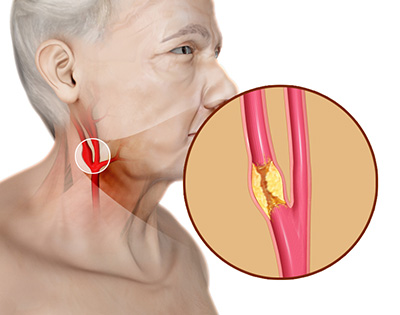Recognizing the Urgent Signs to Consult a Carotid Artery Doctor
Carotid artery disease is a severe condition that can lead to life-threatening difficulties if not treated promptly. Identifying the symptoms early and seeking advice from a carotid artery doctor can make a significant difference in preventing severe outcomes such as stroke. This guide provides essential information on the signs requiring immediate consultation with a carotid artery disease doctor.
Understanding Carotid Artery Disease:
Carotid artery disease arises when the carotid arteries, the primary blood vessels that give blood to the brain, become restricted or blocked due to plaque buildup. This condition can limit blood flow, increasing the risk of stroke. Early detection and therapy are required to prevent irreversible damage.
Key Signs You Need to See a Carotid Artery Disease Doctor Immediately:
Sudden Weakness or Numbness:
If you feel sudden weakness or numbness in your face, arm, or leg, especially on one side of the body, it's a potential sign of a stroke. This symptom indicates that the brain is not receiving enough blood, and it's critical to see a carotid artery doctor immediately.
Difficulty Speaking or Understanding Speech:
Experiencing sudden difficulty in speaking, slurring words, or understanding what others are saying can be a warning sign. This can happen when a clot from the carotid artery travels to the brain, obstructing blood flow.
Loss of Vision or Blurred Vision:
Sudden vision loss in one or both eyes or blurred vision can indicate a blockage in the carotid artery. The retina, part of the brain, relies on adequate blood flow, and vision problems can indicate compromised circulation.
Severe Headache with No Known Cause:
An abrupt and severe headache that has no known cause can be a symptom of carotid artery disease. This type of headache often signals that a stroke may be imminent, necessitating immediate medical attention.
Dizziness or Loss of Balance:
Sudden dizziness, loss of balance, or coordination issues are potential indicators of carotid artery disease. These symptoms can result from insufficient blood flow to the brain.
Risk Factors Increasing the Urgency to Consult a Carotid Artery Surgery Doctor:
While the symptoms mentioned are direct indicators, certain risk
factors heighten the urgency to see a carotid artery surgery doctor:
- Age:
Individuals over 65 are at higher risk.
- Family History:
A stroke or cardiovascular disease history can increase your risk.
- High Blood Pressure:
Chronic high blood pressure can break the arteries, leading to plaque
buildup.
- Smoking:
Smoking significantly increases the risk of carotid artery disease.
- Diabetes:
Diabetes can contribute to arterial damage and plaque formation.
- High Cholesterol: Elevated cholesterol levels can accelerate plaque buildup in the arteries.
Diagnostic Measures by a Carotid Artery Disease Doctor:
When you visit a carotid artery disease doctor, several diagnostic tests may be performed to assess the condition of your arteries:
Carotid Ultrasound:
A non-invasive examination that uses sound waves to create images of the carotid arteries, helping to detect narrowing or blockages.
Magnetic Resonance Angiography (MRA):
An imaging technique that provides clear pictures of the blood vessels, highlighting any abnormalities in the carotid arteries.
Computed Tomography Angiography (CTA):
This test combines a CT scan with an injection of contrast material to visualize the carotid arteries.
Cerebral Angiography:
A more invasive procedure involves inserting a catheter into the blood vessels and injecting dye to visualize the arteries on X-ray images.
Treatment Options Offered by a Carotid Artery Doctor:
Based on the severity of the condition, a carotid artery doctor may recommend various treatment options:
Lifestyle Changes and Medication:
For mild cases, doctors often advise lifestyle differences such as quitting smoking, eating a nutritious diet, and exercising regularly. Medications may also be prescribed to control blood pressure, cholesterol, and blood sugar levels.
Carotid Endarterectomy:
A standard surgical procedure is when the carotid artery surgery doctor removes plaque from the artery to restore normal blood flow. This is usually recommended for significant blockages.
Carotid Artery Stenting:
A less invasive procedure where a stent (a small, expandable tube) is placed in the artery to keep it open. This is often used for patients who are at high risk for surgery.
Antiplatelet Therapy:
Medications like aspirin may be specified to reduce the risk of stroke by stopping blood clots from forming.
Importance of Regular Check-Ups with a Carotid Artery Disease Doctor:
Even without symptoms, regular check-ups with a carotid artery disease doctor are vital, especially for those with risk factors. Early detection through routine screenings can help manage the condition proactively and prevent serious complications.
Steps to Take if You Experience Symptoms:
If you or someone you know experiences any of the signs mentioned, it's
crucial to act swiftly:
- Call emergency services: If you experience symptoms of a
stroke, immediate medical attention is paramount.
- Do Not Ignore
Symptoms: Though symptoms seem to subside, they can be a warning sign
of a more significant issue.
- Schedule an Appointment: If you have risk aspects but no immediate symptoms, schedule an appointment with a carotid artery disease doctor for an evaluation.
Recognizing the symptoms of carotid artery disease and seeking prompt
medical attention from a specialized carotid artery doctor can be lifesaving.
Understanding your risk factors and maintaining regular health check-ups are
essential steps in managing this condition effectively. By staying informed and
proactive, you can safeguard your health and decrease the risk of severe complications.


Comments
Post a Comment